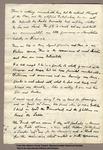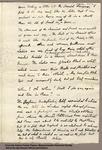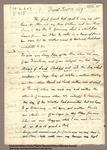Ferrol Decr. 12. 1779
The french Consul had agreed to carry me, Mr. Dana, Mr. Allen, and my three Children and our three Servants, this Day to Corunna, which is about five Leagues from this Place by Water, in a barge of fourteen Oars, but the Weather proved so boisterous, that it was impossible to go.
To give you some Idea of the Place where We are, Cape Finisterre, and Cape Ortugal are two long Arms of Land stretched out into the Sea, which embrace a large Bay of Water. Within this Bay are two other Points of Land, within one of which is Ferrol, where we now are, and within the other is Corunna where We intended to have gone this day, if the Weather had permitted, but We hope to go tomorrow. We can get neither Horses nor Mules nor Carriages in this Place for our Selves nor our Baggage, which I am much surprized at, as it is so grand a Port.
Living, and conveniences for Conveyance are very dear, in this Place, which will run my Expences very high.
Page 2
There is nothing remarkable here, but the natural strength of the Place, and the artificial Fortifications, together with the Arsenals, dry Docks, Barracks, and military Matters by Sea and Land. The City is small, not very well built nor accommodated. Very little Commerce, or Manufactures, Industry or Diversions.
There are two or three elegant Churches, and there is an Italian Opera. There is the Appearance of much Devotion and there are many Ecclesiasticks.
It is dull enough to be in a Country so wholly ignorant of the Language and Usages, but We have furnished ourselves with a Dictionary and grammar, and are learning every Hour. Charles is much pleased with what he sees and hears, and behaves very discreetly. John is writing to you and his sister and Brother.
I excused myself from dining to day on board the Souvereign and on board the Jason, two french Men of War. Yesterday I dined on board the Triomphant, and the Children on Board the Jason.
The French Officers appear to day, with Cockades, in Honour of the Triple alliance -- a large white Ribbon for the french, a smaller red one for the Spaniards, and a black one for the Americans, which makes a pretty Appearance.
Page 3
Upon looking a little into the Spanish Language, I find it so very nearly like the Latin that I am persuaded we shall learn more of it in a Month than We did of french in half a Year.
The Manners of the Spaniards and french are as opposite as grave and gay. The Dress of the Spanish Officers is much like the french, that of the People, a little different. Men and Women, Gentlemen and Ladies are very fond of long Hair, which often reaches braided in a Queue, or bound round with a black ribbon, almost down to their Hams. The Ladies wear Cloaks black or white which come over their Heads and shoulders and reach down to their Waists. They have fine black Eyes and consequently dark, but yet lively complexions.
When! Oh When! shall I see you again and live in Peace?
The Russian Embassador, lately appointed to relieve the one lately in London passed through France and was a fortnight or three Weeks at Paris from whence, the shrewd Politicians have conjectured that Peace was about to be mediated by that Power. But it is said that England is as reluctant to acknowledge the Independance of America, as to cede Gibraltar, the last of which is insisted on as well as the first. But this is only Bruit. Adieu.



